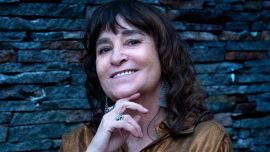Argentina’s government formalised three key appointments this Wednesday in the Official Gazette.
Businessman Alejandro 'Alec' Oxenford presented his credentials to US President Donald Trump, formally confirming his role as ambassador to the United States, while Foreign Minister Gerardo Werthein appointed a new ambassador to Germany.
The appointment of the new Argentine representative in Berlin, diplomat Betina Pasquali de Fonseca, would not ordinarily stand out, were it not for the fact that she replaces a figure who will now hold a key position at the Palacio San Martín: Fernando Brun, who has been appointed as Argentina’s new International Economic Relations secretary.
The post had been practically vacant in the Foreign Ministry’s organisational chart since the departure of Marcelo Cima in October 2024, which coincided with the replacement of former foreign minister Diana Mondino after Argentina’s vote against the trade embargo on Cuba that “angered” the Casa Rosada, from where foreign policy directives are issued.
‘Diplomatic chainsaw’
The three decrees, dated June 18, consolidate a pattern that has been repeated since Javier Milei assumed the Presidency: that of a “diplomatic chainsaw,” focused on technical and commercial profiles aligned with the ideological guidelines of Milei’s inner circle.
Via Decree 402/2025, the executive formally appointed Alejandro Carlos Francisco Oxenford as Ambassador Extraordinary and Plenipotentiary to the United States. He had already been serving “on commission” since February, but the Senate formally gave its approval. Now, the ambassador has presented his credentials to Trump, reaffirming Argentina’s intention to strengthen its strategic alliance with Washington.
Oxenford is a tech entrepreneur, the founder of DeRemate.com, as well as art collector and influential figure in the cultural and financial ecosystem. His mixed profile, without diplomatic training, reflects Milei’s approach of prioritising individuals with direct links to the global business world, in line with his radical economic liberalisation plan.
The main development, however, is the appointment of Fernando Brun as the new International Economic Relations secretary at the Foreign Ministry, formalised via Decree 413/2025. This is a key position – the post-holder coordinates trade agreements, multilateral negotiations and relations with blocs such as Mercosur. The role has been vacant or filled on an interim basis since the departure of Mondino back in October 2024.
Dissolution
Mondino’s exit led to the dissolution of her team, with the exception of Foreign Policy Secretary Eduardo Bustamante. Career diplomat Marcelo Cima was removed and the post was temporarily held by Luis María Kreckler, a retired ambassador specially brought in by Mondino.
Kreckler, who had held similar positions during the Kirchner administrations, was serving as consul in São Paul. His time at the Secretariat was a temporary solution to avoid his definitive departure from the Foreign Service.
Amid the disorder, Juan Pazo – former coordinating secretary at the Production Ministry and a figure seen as close to Economy Ministry Luis Caputo – even briefly occupied the post.
Pazo was announced in that role only a few days earlier, but his appointment was never formalised: in December last year, the unexpected departure of Florencia Misrahi from the Foreign Ministry forced the government to reshuffle its line-up, and Pazo ended up taking a position at the Secretariat for Coordination in the economic portfolio.
Enter Brun
Starting June 18, Brun ends his informal arrangement with a permanent appointment. As former Argentine ambassador to Germany, he had received the presidential delegation accompanying Javier Milei on his first official visit to that country in June 2024, when the head of state met with former German chancellor Olaf Scholz.
Brun will bow become part of the core leadership of the Palacio San Martín under Gerardo Werthein’s command, alongside figures such as Francisco Tropepi (who replaced Ricardo Lagorio at the United Nations), Gerardo Díaz Bartolomé (former right-hand man to Mondino and current consul in New York), the chief-of-staff at the Foreign Ministry, Ricardo Lachterman, and Bustamante himself.
Further changes and removals are expected, with ambassadors seeking to hold on to posts in key destinations such as Brasília or Europe amid the ongoing internal reorganisation.
Career diplomat
Brun is a career diplomat, with a notable track record in Brazil, Germany and at the Secretariat for Strategic Affairs under former president Alberto Fernández’s 2019-2023 government. However, his promotion was blocked for years by a “hard-line Kirchnerite” faction, particularly Senator Oscar Parrilli, who opposed his advancement when he worked with Gustavo Béliz at the Casa Rosada.
For now, the decree grants him the rank of Ambassador Extraordinary and Plenipotentiary, ad honorem, for protocol purposes only, while he serves at the Foreign Ministry. One of his immediate responsibilities will be the national coordination of the Mercosur summit to be held in Buenos Aires on July 2 and 3.
Brun holds a degree in Political Science and International Relations from Catholic University of Argentina (UCA) and has written extensively in the press on trade, energy and geopolitics. He has a technical profile, focused on business development, and experience with hydrogen, mining and public–private investment projects.
The third significant appointment was that of Betina Alejandra Pasquali de Fonseca as Argentina's new ambassador to Germany, a position previously held by Brun himself.
The diplomat, who presented credentials to the King of Norway during a previous posting, is 66 years old and nearing retirement, but has a strong command of German and experience in protocol.


















Comments